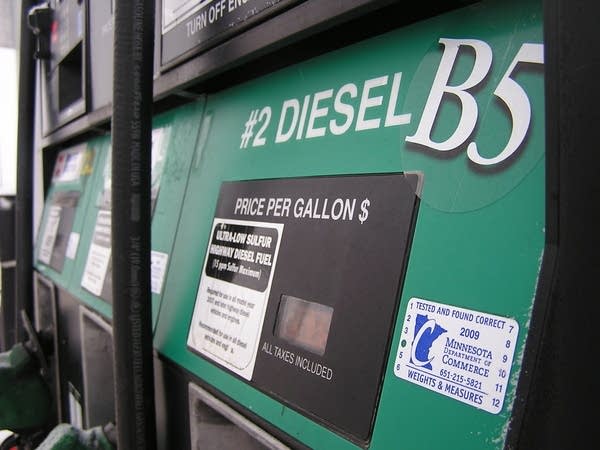Future of biodiesel depends on federal subsidies
Go Deeper.
Create an account or log in to save stories.
Like this?
Thanks for liking this story! We have added it to a list of your favorite stories.

The struggling biodiesel industry is bracing for more bad news.
An important federal subsidy for the renewable fuel will expire in just a few days. Some predict losing the subsidy could shut-down U.S. biodiesel production.
Although it's likely Congress will renew the subsidy at some point next year, the lapse of the credit could impact Minnesota's 5 percent biodiesel mandate.
Biodiesel is produced mainly from soybean oil, but also from animal fat and waste cooking oil.
Turn Up Your Support
MPR News helps you turn down the noise and build shared understanding. Turn up your support for this public resource and keep trusted journalism accessible to all.
The farm-based fuel is not as well known as its controversial sibling, corn based ethanol, but like ethanol, biodiesel relies on subsidies to stimulate production.
Biodiesel supporters say the fuel is worth subsidizing because it burns cleaner than regular diesel with fewer greenhouse gases. It also gives farmers another market for their crops.
But the industry's most important subsidy will expire at the end of the December, and that's causing some troubling predictions.
"Without an extension of the tax credit, all U.S. biodiesel production will grind to a halt," said Sen. Charles Grassley, R-Iowa. "Plants will be shuttered, and workers will be let go."
Grassley urged Congress recently to renew the $1-a-gallon subsidy. It's paid to refineries that blend the renewable fuel into their products, but with health care consuming nearly all its time, Congress failed to act before the holiday break.
Grassley said losing the subsidy is another blow to an already faltering industry. Low profit margins have meant that U.S. biodiesel plants are operating at just 15 percent of capacity.
Grassley predicts the subsidy loss will force the remaining operations to close, costing some 23,000 jobs. By one estimate, more than 5,000 of those jobs are in Minnesota.
But will Senator Grassley's dire forecast come true?
Ron Marr, who works for the state's largest biodiesel plant, Minnesota Soybean Processors, said despite Grassley's prediction of a total industry shutdown, his plant will continue to make the fuel.
"We know we'll be making biodiesel Jan. 1," Marr said. "There'll be some demand remaining, particularly the Minnesota market."
Marr said that demand is generated by the state's biodiesel mandate. The mandate requires that nearly all diesel fuel sold in Minnesota must contain at least 5 percent biodiesel.
Even though the tax credit will expire, state officials believe there will be enough biodiesel produced to meet Minnesota's needs.
Jim Pearson, deputy commissioner with the Minnesota Commerce Department, said he'll be watching the situation.
"We're unsure of the impact," Pearson said. "Obviously we're very interested in the issue and we've been talking with a lot of stakeholders about it."
Pearson said the Commerce Department can suspend the 5 percent requirement if refineries in the state are unable to find enough biodiesel. The loss of the subsidy also could raise prices.
Minnesota Trucking Association President John Hausladen said the federal payment has helped pay the cost of producing biodiesel. With the subsidy gone, consumers will have to pick up the bill.
Hausladen said he expects diesel fuel prices to rise about a five cents a gallon. He says the hike comes at a bad time for the industry.
"This is the toughest market that truckers have faced in a very long time. There's freight being moved, but the rates are very soft," he said. "We see shippers asking trucking companies to haul it for less. So anything that will increase our cost is going to be very difficult to pass on to shippers that are struggling."
The biodiesel subsidy issue is the latest in a series of debates over funding renewable energy.
The wind power industry has seen a key federal tax credit lapse several times, hurting development of new wind farms.
The ethanol industry has mostly escaped any problems, although one subsidy was reduced slightly.
Subsidy critics like author Robert Bryce say the biodiesel crisis proves true what he's been saying for years: the federal government should stay out of the energy business.
"Congress should just quit now," Bryce said. "The fact that the biodiesel industry is unlikely to survive without subsidies shows that the industry itself is simply not sustainable."
But there are no plans in Congress to abandon biodiesel, and even critic like Bryce admits it's likely the lapsed subsidy will be reinstated sometime in 2010.
How long that takes to happen could determine how many biodiesels plants remain alive to collect it.



